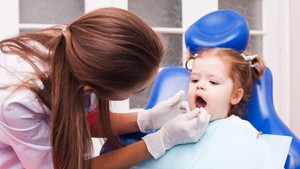Blog
Wondering when my child should first visit the dentist? You’re in good company. Early dental care lays the foundation for lifelong oral health, and timing truly matters.
Wondering when my child should first visit the dentist? You’re in good company. Early dental care lays the foundation for lifelong oral health, and timing truly matters. Parents often wonder about the first dental appointment age and how to plan the first dentist appointment. This guide explains the ideal age for the first dentist appointment, what typically happens during that visit, and how to prepare your child, and yourself, for a smooth, positive experience. Whether you’re welcoming a new baby or planning ahead for a toddler, you’ll find clear, practical tips to protect developing teeth and foster confident, happy smiles.
The Best Time for a First Dental Visit
Parents frequently ask, When should my child first visit the dentist? The most reliable rule of thumb is: first tooth, first birthday. As soon as the first tooth appears, usually around 6 months, your child is ready for professional dental care. By age one, an initial exam helps set the groundwork for healthy habits and allows a provider to monitor growth, identify concerns early, and coach caregivers on brushing, nutrition, and behaviors that keep baby teeth healthy. Understanding the first dental appointment age helps families schedule confidently and establish a routine.
Leading pediatric and dental organizations recommend scheduling the first dentist appointment no later than your child’s first birthday, or within six months of the first tooth erupting. This recommendation reflects the ideal age for first dentist visit and supports early oral health milestones. Early guidance also clarifies the first dentist appointment age and how bite and jaw development may benefit from timely evaluations.
Sometimes, signs point to booking sooner. Watch for white or brown spots on teeth, sensitivity during meals, persistent bad breath, bleeding or puffy gums, prolonged thumb-sucking or pacifier use (especially past age two), mouth breathing, or difficulty chewing. Noticeable crowding, bite misalignment, or jaw clicking also warrant early evaluation. Taking action now can prevent more complex issues later. Early visits build familiarity, reduce fear, and establish a positive routine, schedule your child’s first dentist appointment to put healthy habits in motion and confirm the appropriate first dental appointment age.
What to Expect at the First Dental Appointment
Wondering when should your child first visit the dentist and what happens next? A first dentist appointment begins with a warm welcome and a gentle orientation to the office. The dental team will review medical and dental history, then carefully examine the teeth, gums, bite, and jaw growth. Depending on age and need, they may perform a brief cleaning to remove plaque. Fluoride may be recommended to strengthen enamel, and X-rays are only taken when clinically necessary and appropriate for your child’s age. Knowing the age for the first dentist visit makes it easier to anticipate these steps.
During the evaluation, the dentist looks at tooth eruption patterns, spacing, enamel health, gum condition, and any habits, like thumb-sucking or pacifier use, that might influence bite development. They screen for early signs of cavities, tongue or lip ties, and track jaw alignment. If early orthodontic guidance could help, a referral may be suggested to assess growth and bite, providing clear recommendations without pressure. This approach ensures the first dentist appointment age aligns with your child’s developmental needs.
To set your child up for success, choose an appointment time when they’re rested and fed, bring a favorite comfort item, and use simple, positive language such as the dentist helps keep your smile healthy. Practice open wide at home and avoid sharing any personal dental anxieties. Invite questions and celebrate bravery after the visit. A calm, supportive environment helps every first dentist appointment feel comfortable and reinforces the ideal first dental appointment age.
Helping Your Child Prepare
As the first dentist appointment approaches, thoughtful preparation can make the experience smooth and stress-free. Introduce the idea in upbeat, age-appropriate terms: the dentist counts teeth, checks smiles, and helps keep mouths healthy and strong. Keep conversations short and reassuring, and link the visit to a familiar routine, like brushing before bedtime, to build comfort.
Children’s books about the dentist are excellent tools for normalizing the experience. Choose stories with friendly characters, simple illustrations of common tools, and a clear outline of what happens in the chair. Read together in the weeks leading up to the visit, pause to answer questions, and highlight how proud and brave the characters feel afterward. This can help set expectations around the age for first dentist visit and the first dental appointment age.
Role-playing also helps. Take turns being the dentist and the patient, count teeth, practice opening wide, and pretend to use a tiny mirror. Let a favorite toy visit the dentist at home. While playing, describe what to expect: a comfy chair, bright lights, a quick look at teeth and gums, and plenty of smiles and encouragement. Using these strategies before the first dentist appointment supports confidence and readiness, regardless of the first dentist appointment age.
What Parents Can Do Before the Appointment
Preparing for your child’s first dentist appointment starts with a few essentials. Bring any medical or dental history, a list of medications and allergies, your insurance card, and identification. If your child uses a pacifier or sucks their thumb, note how often. For infants and toddlers, a favorite comfort item and awareness of nap and feeding routines can help you choose a time when your child is most cooperative, especially around the age for the first dentist visit.
Arrive with a short list of questions to make the visit productive. Consider asking: When should my child first visit the dentist? How do I clean my baby’s gums and first teeth? Which toothbrush and toothpaste are best for my child’s age? How often should we schedule check-ups and cleanings? What should I know about fluoride, sealants, and cavity prevention? If your child uses a pacifier or sucks their thumb, request guidance on timing and gentle strategies to curb the habit. You can also ask about how jaw growth and tooth spacing may influence future needs and the ideal first dental appointment age.
Children take cues from their caregivers, so a calm, positive attitude goes a long way. Use simple, encouraging phrases, talk about counting teeth and keeping smiles strong, and avoid words that might create fear. Book the visit when your child is well-rested, offer reassurance, and celebrate small wins with praise. This confidence-building approach helps your child trust the dental team and sets the stage for healthy habits as you plan the age for first dentist visit and confirm the first dentist appointment age.
Start Early for Lifelong Oral Health
Answering When should my child first visit the dentist? is simple: at the first tooth or by the first birthday. Early care supports healthy development, prevents small issues from becoming big ones, and builds comfortable, positive routines around oral health. With a gentle introduction, practical preparation, and guidance from trusted professionals, your child can enjoy confident, cavity-free smiles for years to come. Use this information to determine the first dental appointment age and schedule the first dentist appointment at the right time, ensuring the ideal age for first dentist visit is met.





